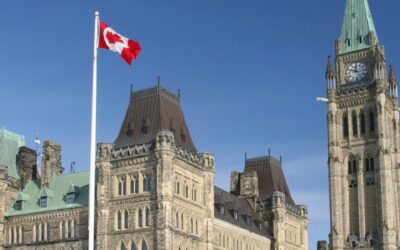OTTAWA—Rick Smith, President of the Canadian Climate Institute, and Peter Nicholson Sr., Chair of the Board of the Canadian Climate Institute, made the following statement ahead of the return of Parliament next week:
“As Parliament resumes this fall, the federal government must act urgently to address the ways climate change is threatening Canadians’ health, security, economic competitiveness, and ways of life.
“This summer, we were reminded once again how climate change threatens the safety and security of communities across the country by contributing increasingly to drought, fire, extreme heat, and degraded air quality. Both the return of Parliament and the forthcoming release of the government’s climate competitiveness strategy offer opportunities to move forward with pragmatic action that keeps people safe, drives emissions down, and supports economic competitiveness when it is needed most.
Climate change is a threat to health and safety across Canada
“The second-worst wildfire season on record has consumed millions of hectares of forest and land, forced the evacuation of numerous communities, shattered heat records, and blanketed the country’s largest cities in smoke— impacting air quality for millions of people across Canada, the United States, and even parts of Europe. Communities not typically known for wildfire activity, including in Atlantic Canada, now face record drought conditions and increasing fire risks.
“The cause of these escalating dangers is clear: climate change is putting people’s lives and livelihoods at risk in every region across Canada. In fact, these threats are ongoing: much of the country continues to face dangerous wildfires and smoke advisories. That means continued disruptions to communities and industries, impacts on agriculture, and foregone tourism revenue in a year Canadians have been encouraged to travel domestically.
Six policy priorities to protect Canada’s economic security and competitiveness
“As governments work to support Canadian businesses in navigating new economic constraints and unpredictable trade dynamics, parliamentarians also need to be clear-eyed about the additional pressures climate change is placing on the country’s economic security—pressures that will only worsen if they don’t receive the right policy attention now.
“In addition to upending global trade, the Trump administration has taken steps to make the U.S. economy less competitive by backing away from affordable clean technologies at exactly the time other major economies are doubling down on decarbonization. We urge the federal government to define and implement a robust climate competitiveness strategy, while moving swiftly on six policy priorities:
- Modernize Canada’s industrial carbon pricing systems to ensure they drive real emissions reductions and low-carbon investment.
- Enact the Clean Electricity Investment Tax Credit which, in concert with the Clean Electricity Regulations, will accelerate the build-out of low-cost clean electricity across the country.
- Maintain a strong Electric Vehicle Availability Standard that will help Canadians find better, more affordable vehicle options, while also creating flexibility for vehicle manufacturers.
- Finalize methane regulations for the oil and gas sector, one of the most effective ways to cut industry emissions using commercially available technologies often developed by Canadian companies.
- Establish a made-in-Canada climate investment taxonomy to guide private capital toward low-carbon projects that support long-term economic growth and competitiveness.
- Apply clear flood and fire resilience criteria for federally supported housing, ensuring new homes are built on safer ground—a move that could save lives and billions in future disaster costs.
Swift and decisive action is necessary
“Canadians need all orders of government to act swiftly and decisively in the face of these threats. Climate change is already affecting millions of Canadians and is a defining challenge for Canada’s economy.
“When Parliament reconvenes next week, we urge the federal government to meet the moment with policies that bolster low-carbon competitiveness, reduce emissions to meet our declared targets, and accelerate adaptation to future climate impacts. Canada’s ability to thrive in the global energy transition, keep communities safe, and ensure long-term prosperity depends on the actions our elected leaders take right now.”
RESOURCES
- Blog | The federal government should act decisively to modernize industrial carbon pricing
- Media statement | Clean electricity regulations are a flexible and pragmatic tool to reduce emissions and attract investment
- Media statement | Canada’s review of the electric vehicle mandate—and other climate policies—must be swift and grounded in evidence
- Insight | Finalizing Canada’s oil and gas methane regulations would be an easy win for climate progress
- Media statement | New climate taxonomy and disclosure rules set to drive drive long-term investment in Canada
- Op-ed | Location, location, location: building much-needed homes on safer ground could save Canada billions of dollars
- Fact sheets | Climate change and wildfires; Climate change and drought
MEDIA CONTACTS
Claudine Brulé (Eastern Time)
(226) 212-9883
cbrule@climateinstitute.ca
Krystal Northey (Mountain Time)
(226) 212-9883
knorthey@climateinstitute.ca
The Canadian Climate Institute is Canada’s leading climate change policy research organization. We produce rigorous analysis, economic modelling, and in-depth research, and have experts available to comment on topics including: low-carbon competitiveness, the costs of climate-related disasters in Canada, and Canada’s progress in reducing emissions.




